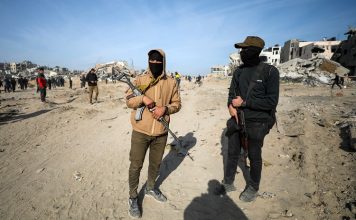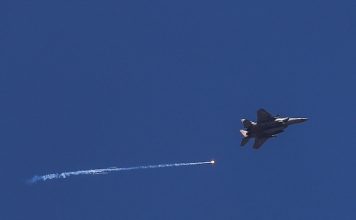Threats faced by journalists reporting about Iran from abroad are “unprecedented,” said Fiona O’Brien, the London Bureau Director of Reporters Without Borders (RSF) during an April 17 online event to launch its report on the issue.
The report was titled, “Watch out because we’re coming for you: transnational repression of Iranian journalists in the UK.”
Transnational repression is sometimes defined as a form of political suppression conducted by states outside of their borders, to target opponents and silence critics with the aim of keeping power. Iran’s government has publicly threatened reporters in recent years not to produce negative stories about Iran. Reports of harassment and intimidation by journalists in the United Kingdom writing about Iran have increased significantly.
The title of the report was taken from a comment made in October 2022 by Hossein Salami, the Commander-in-Chief of the Islamic Revolutionary Guard Corps (IRGC) against those he said were producing misinformation about Iran. The warning was issued during nationwide anti-government protests which swept the country following the death of Mahsa Amini while she was in police custody. Coverage of the protests was met with anger by the regime and included a surge in public attacks against foreign journalists.
Threats to UK Journalists Writing About Iran, China and Hong Kong – Reporters Without Borders Survey
“The level of threat is really unprecedented, and that comes at enormous professional and personal costs,” O’Brien said. “The journalists at all of these outlets show enormous resilience and courage, but the bottom line is that even though they are working in a country which says it champions press freedom, they are not able to work freely and without fear.”
The event was hosted by O’Brien with guest speakers Nazenin Ansari, the publisher of Kayhan Life and Kayhan London, and Adam Baillie, the spokesperson for news channel Iran International.
Speaking about Iran International TV presenter Pouria Zeraati, who was stabbed in the leg outside his London home on March 29, Baillie said: “It’s had a huge impact on people, journalists working at Iran International and the wider staff but it could have been worse, he could have been killed. They would have had time to kill him, it clearly looked like a warning attack.”
After Zeraati Stabbing, More Iran International Journalists Are At Risk in UK, Channel Says
The perpetrators boarded a plane at Heathrow airport and fled the country within hours of the attack. No arrests have yet been made and a motive for the attack has not been established.
Ansari, who has herself been threatened for her reporting, explained the importance of exile journalism – news production by journalists who have had to flee their home countries to be able to report safely.
“Our objectives have always been to adhere to truth and accuracy as our core values, and to disseminate news regarding the political and economic situation in Iran, to analyze the impact and the consequences of the present regime’s policies and raise awareness of people’s rights,” Ansari added. “As you can imagine, these all fall outside of the red lines of the Islamic Republic.”
“The Minister of Culture and Islamic Guidance in Iran has a monopoly in that the department is not only the main regulatory body, but also allows who is able to have access to media,” Ansari said. “The press laws in Iran also include a clause which has 19 lines about who may not have access to media, and of course one of the red lines is publishing articles against the Constitution and its principles, promoting subjects which might damage the foundation of the Islamic Republic and offending the leader of the revolution.”
Ansari noted that several foreign news agencies also supported pluralism and democracy in their reporting.
RSF’s report, which was based on a survey completed by 28 journalists living in the UK, found that almost 90 percent of journalists had experienced online threats and harassment in the last five years. These included death and rape threats.
Women were disproportionately affected by online abuse which often featured sexualized content which were sometimes sent to relatives, such as explicit images to shame them and tarnish their reputations.
At least 60 percent said that Iran-based family members were subjected to threats as a result of their work as journalists.
The impact of these threats on the journalists included suicidal ideas, isolation and exhaustion as well as disruptions to family life.
The report identified several actors responsible for the repression. While the Iranian government and its proxies were cited as the main source of the harassment, it added that members of the Iranian diaspora, opposition groups and political activists had also targeted journalists accused of being sympathetic towards the regime.
Journalists from Iran International, Voice of America and BBC Persian have all reported threats and intimidation by agents and third parties believed to be connected to the Islamic Republic.
The incidents have met with concern from several lawmakers in the UK. An April 16 post on X by Lord David Alton featured a video clip of a debate in the British House of Commons in which he urged the government to proscribe the IRGC for its involvement in the repression of journalists in the UK.
The BBC World Service submitted an urgent updated complaint to the United Nations on April 16 about several of its journalists allegedly convicted by a court in Tehran in February 2022 for “propaganda against the Islamic Republic.” The Islamic Republic has not responded to the initial complaint.
The RSF report made several recommendations for the British government, UK law enforcement and social media platforms such as the provision of better security and protection for at-risk journalists, faster and more effective ways of dealing with online violence against journalists and the addition of the transnational repression of reporters in the UK’s National Action Plan for the Safety of Journalists.













